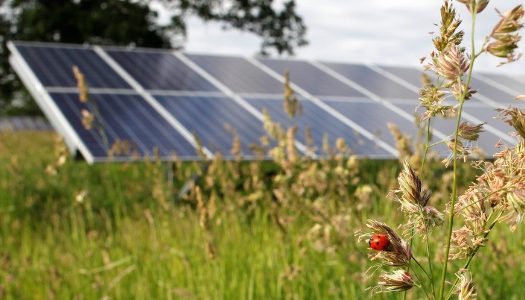Leading renewable energy consultancy and service provider, Natural Power, has been supporting the trade association, Solar Energy UK, in creating the recently launched ‘Natural Capital Best Practice Guidance’ on how to increase biodiversity at all stages of a solar farm’s lifecycle.
Belinda Howell, a Senior Environmental Consultant at Natural Power, took on the role of Vice-Chair of the Natural Capital Working Group and contributed to several chapters in the guide. She said: “As an industry, we need to build the profile of best practice for well-designed solar sites to help tackle ecological challenges whilst meeting our net zero targets.”
“We’re delighted to see this best practice guide come to fruition. It was a great collaborative effort between members of Solar Energy UK, combining the expertise of those who build, manage and own solar farms, and experienced ecologists, into a useful guidance document for all stages of a solar farm’s lifecycle.”
As the UK works toward its carbon targets and continues to develop clean, affordable energy, the increasing land use of renewable energy technologies means they must address the impacts through best practices. According to the state of nature report, 60% of British wildlife species monitored have declined since 2019, and 15% face extinction due to several factors such as pesticides and habitat loss.
Well-designed and well-located solar farms can help reverse this by directly enhancing local animal habitats and wildlife while providing renewable, low-cost energy.
Chris Hewett, Chief Executive of Solar Energy UK, said: “Land management is a central part of the solar industry. In the UK, we have growing evidence that wildflowers, pollinators, and bird species thrive on solar farms. Solar Energy UK is today promoting how solar can best play a role in the nature recovery agenda and cutting carbon emissions.”
The best practice guide explains how project developers are responding to this ecological emergency by developing high-quality solar farms that can help the land recover from intensive farming, enable the natural environment to flourish, and support community buy-in for solar farms.
The development of large scale, ground mounted solar is an excellent opportunity to implement dual use projects, with land supporting the UK’s energy self-sufficiency and nature recovery. Leftover space, such as shade zones or easements, can also be set aside for grassland and wildflower meadows, providing ideal habitats for pollinators, insects, birds, grazing mammals, and other wildlife species.
To find out more and download the guide visit https://solarenergyuk.org/resource/natural-capital-best-practice-guidance/



























